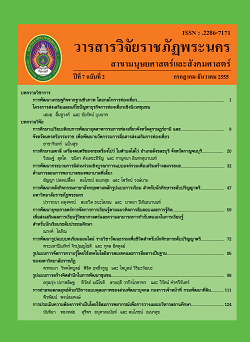การพัฒนารูปแบบบทเรียนออนไลน์ รายวิชาวัฒนธรรมเพื่อชีวิต สำหรับนักศึกษาระดับปริญญาตรี
Main Article Content
Abstract
การวิจัยครั้งนี้มีวัตถุประสงค์ 1) เพื่อพัฒนารูปแบบบทเรียนออนไลน์ รายวิชาวัฒนธรรมเพื่อชีวิต ให้มี ประสิทธิภาพตามเกณฑ์มาตรฐาน 90/90 2) เพื่อศึกษาผลสัมฤทธิ์ทางการเรียนก่อนเรียนและหลังเรียนของ นักศึกษาที่เรียนผ่านรูปแบบบทเรียนออนไลน์ การวิจัยนี้เป็นการวิจัยแบบกึ่งทดลอง (Quasi Experimental Research) ประชากรคือ นักศึกษาปริญญาตรีชั้นปีที่ 1 มหาวิทยาลัยราชภัฏพระนคร รายวิชาความจริงของ ชีวิต ภาคเรียนที่ 2 ปีการศึกษา 2555 จำนวน 2950 คน กลุ่มตัวอย่างได้แก่ นักศึกษาปริญญาตรีชั้นปีที่ 1 รายวิชาความจริงของชีวิต จำนวน 80 คน โดยวิธีการสุ่มตัวอย่างอย่างง่าย (Simple Random Sampling) ดำเนินการวิจัยตามรูปแบบการพัฒนาสื่อการเรียนการสอน ADDIE model เครื่องมือที่ใช้ในการวิจัยได้แก่ รูปแบบบทเรียนออนไลน์ รายวิชาวัฒนธรรมเพื่อชีวิต แบบประเมินรูปแบบบทเรียนออนไลน์ รายวิชา วัฒนธรรมเพื่อชีวิต แบบประเมินรูปแบบและคุณภาพด้านเนื้อหาและด้านบทเรียนออนไลน์ แบบทดสอบวัดผล สัมฤทธิ์ทางการเรียน สถิติที่ใช้ในการวิเคราะห์ข้อมูลมี คือ ค่าร้อยละ (E1/E2) ค่าเฉลี่ย (Mean) ค่าความเบี่ยงเบน มาตรฐาน (Standard Deviation: SD) การหาค่าดัชนีความสอดคล้อง IOC (Index of Consistency: IOC) การหาประสิทธิภาพของบทเรียนออนไลน์ E1/E2 การหาความยากง่าย (p) อำนาจจำแนก (r) ความเชื่อมั่น ของแบบวัดผลสัมฤทธิ์ทางการเรียน (สูตร KR-20) Kuder Richardson ในการเปรียบเทียบผลสัมฤทธิ์ ก่อนและหลังเรียน คือ t-test (Dependent Sample)
ผลการวิจัยพบว่า
1. ผลการพัฒนารูปแบบบทเรียนออนไลน์ รายวิชาวัฒนธรรมเพื่อชีวิต สำ หรับนักศึกษา ระดับปริญญาตรี ได้ธรรมจักรโมเดล 3 ขั้นตอน 8 องค์ประกอบ ซึ่งประกอบด้วย 1.ขั้นปริยัติ (ก่อนเรียน) ประกอบด้วย 1.1 สัมมาทิฏฐิ (รับรู้) 1.2 สัมมาสังกัปปะ (ริเริ่ม) 1.3 สัมมาวาจา (สนทนา) 2.ขั้นปฏิบัติ (ระหว่างเรียน) ประกอบด้วย 2.1 สัมมากัมมันตะ (เรียนรู้) 2.2 สัมมาอาชีวะ (นำไปปฏิบัติ) 2.3 สัมมาวายามะ (ทบทวนบทเรียน) 3.ปฏิเวธ (ประเมินผล) ประกอบด้วย 3.1 สัมมาสติ (ตรวจสอบความรู้) 3.2 สัมมาสมาธิ(ทดสอบ) ผ่านการประเมินรูปแบบจากผู้เชี่ยวชาญ โดยรวมมีค่าเฉลี่ยเท่ากับ 4.75 ส่วนเบี่ยงเบนมาตรฐาน เท่ากับ 4.13 ระดับความเหมาะสมเท่ากับ เหมาะสมเมื่อพิจารณาเป็นรายข้อพบว่า ระดับความเหมาะสม เท่ากับ เหมาะสม ทุกขั้นตอนและทุกองค์ประกอบ
2. ผลการพัฒนาบทเรียนออนไลน์ รายวิชาวัฒนธรรมเพื่อชีวิต ผ่านการประเมินจากผู้เชี่ยวชาญ ด้านเนื้อหา โดยรวมมีค่าเฉลี่ยเท่ากับ 4.28 ค่าส่วนเบี่ยงเบนมาตรฐานเท่ากับ 0.12 มีระดับคุณภาพอยู่ใน ระดับดี ผ่านการประเมินจากผู้เชี่ยวชาญด้านบทเรียนออนไลน์ โดยรวมมีค่าเฉลี่ยเท่ากับ 4.10 ค่าส่วนเบี่ยง มาตรฐานเท่ากัน 0.27 ระดับคุณภาพเท่ากับ ดี และจากการทดลองกับนักศึกษากลุ่มตัวอย่าง รายวิชาความ จริงของชีวิต ภาคเรียนที่ 1/2555 จำนวน 30 คน มีประสิทธิภาพ 90.51/91.95
3. ผลการศึกษาผลสัมฤทธิ์ทางการเรียนของนักศึกษาที่เรียนผ่านรูปแบบบทเรียนออนไลน์ รายวิชา วัฒนธรรมเพื่อชีวิต ภาคเรียนที่ 1/2555 จำนวน 80 คน มีผลสัมฤทธิ์ทางการเรียน ก่อนเรียนมีคะแนนเฉลี่ย ร้อยละ 60.03 หลังเรียนมีคะแนนเฉลี่ยร้อยละ 91.16 โดยหลังการเรียนสูงกว่าก่อนเรียน อย่างมีนัยสำคัญทาง สถิติที่ระดับ .05
The Development of Online Learning Model for Subject Culture for Life of Bachelor Degree Students
This research aims to: 1. develop effective online lessons of Culture for Life Subject for undergraduate students to meet 90/90 standard, and 2. investigate learning achievement before and after studying of the undergraduate students through online lessons of Culture for Life Subject. This paper improved several online lessons of Culture for Life Subject which were evaluated by 5 experts of development of instructional type, 5 experts of content, and 5 experts of online lessons. The research was divided into 3 steps as follows 1) online lesson development, 2) enhancement and effectiveness evaluation of online lessons regarding the 90/90 standard, and 3) learning achievement estimation before and after studying. The data was gathered by using the online lessons of Culture for Life Subject, evaluation forms to inspect quality of type, content and online lessons, as well as learning achievement test. T-test (dependent sample) was conducted for the data analysis to compare the learning achievement before and after studying.
The research results revealed that 1) To the step of online lesson development, 3 stages and 8 elements of Wheel of Law Model were applied. They consisted of (1) Pariyatti (before studying) included (1.1) Samma Ditthi (perceive), (1.2) Samma Sangkappa (initiate), and (1.3) Samma Vaca (conversation), (2) Patipatti (during studying) included (2.1) Samma Kammanta (learn), (2.2) Samma Ajiva (implement) and (2.3) Samma Vayama (review the lessons), (3) Pativedha (evaluation) included (3.1) Samma Sati (inspect knowledge) and (3.2) Samma Samadhi (test). The development was evaluated by 5 experts of development of instructional type. The overall mean was at 4.75 and the standard deviation was at 4.13. The suitability was at appropriate level. When considering each aspect, it indicated that all steps and elements were at appropriate level.
2) To the step of online lesson development and evaluation, the created lessons met the 90/90 standard and they were approved by the experts of content. The overall mean was at 4.28 and the standard deviation was at 0.12. The quality was at good level and approved by the experts of online lessons. The overall mean was at 4.10 and the standard deviation was at 0.27. The quality was at good level. Regarding an experiment with the samples of 50 undergraduate students who registered Culture for Life Subject in the 1st semester of the academic year 2012, the efficiency of online lessons was at 90.51/91.95.
3. To the learning achievement before and after studying, it demonstrated that the learning achievement of 80 undergraduate students who registered Culture for Life Subject in the 1st semester/2012 after studying (91.16) was higher than the learning achievement before studying (60.03) with the .05 level of statistical significance.
Article Details
Each publish articles were copyright by Phranakorn Rajabhat University
Any contents which appeared in each articles in the journal were authors personal opinion. It did not relate to Phranakorn Rajabhat University and other instructors in the university. Each authors would take responsibility on their articles. If there are any mistake, the authors will take responsibility themselves


